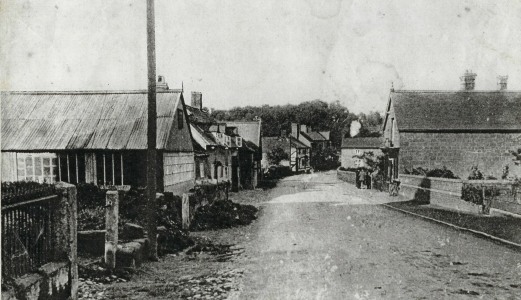
 |
Once upon a time Ruyton had a fire engine and a fire brigade. James
Cooper informed us that the machine had been built by Roberts of Willow Street,
Oswestry and at one time was kept in the buildings which used to stand next to
Platt Bridge Cottage, until the damp from the river rotted the hose. It is not
known when that was but in June 1877 the Vicar was, as usual, begging his
parishioners for money, help and goodwill to restore and take more care of Old
Safety as the engine was called. In 1877, the parish had been given a hearse
and it was stressed that both this new acquisition and the Fire Engine should
be given some form of protection.
Eventually, in August 1880, Mr. Rowland Minton agreed to carry out his
late father's wishes and give a piece of land in the centre of the village
where a special building could be constructed for the two public vehicles. On
the 19th December, Shrewsbury Town Hall and Law Courts were gutted by fire and
this was used as a deadly warning that, during the winter when lights and
fires were so much in use, this sort of accident could happen right here in the
village, and the fire engine was in no state to be of use in such an emergency.
In January 1881, things were at a low ebb; contributions given by the
Rev. Bulkeley-Owen of Tedsmore and Mr. Darby of Little Ness had been spent on
new harness (it being a horse drawn fire engine of course) and Mr. Minton was
reluctant to convey the land until there was some money in the kitty.
Action at last in February 1881! A meeting was held at the school when
the Rev. Bulkeley-Owen gave another £10, Mr. J. H. N. Walford of The Towers
(Ruyton Manor) £5 and Mr. Brown (Hall Farm) gave £1 and agreed to carry the
bricks which it had been decided were cheaper than stone (and conveniently came
from his own brickyard at Shotatton). It was not until November 1883 that the
Account for the Fire Engine and Hearse House was finally closed. The building
had been finished and, thanks to an additional donation from Miss Kenyon, had
a proper roof rather than the circular corrugated iron construction first
proposed.
In July 1883, Old Safety was oiled and painted and led the procession in
the Oddfellows Jubilee celebrations when "loyal old John Cox sat, or
rather stood, in the hose bucket and raised the Royal Standard". Then
the machine languished in its smart new house while the hearse was presumably
in fairly constant use.
In March 1889, there is a reference to “the grand four hours fight in
1871 and, since the late Captain (presumably John Cox) retired on a
pension a few years ago, Safety has been laid up like a hulk in
Portsmouth harbour”.
In August that year, the fire engine was examined by experts and, apart
from the leaking hose, was not in too bad a state. Three months later on
November 20th a man came rushing from Pradoe with orders that the fire engine
should be sent with all haste to fight the conflagration there. A Mr. Swainson
generously offered to put his hunter in the shafts, but Mr. Brown came to the
rescue with a “huge animal as strong as an elephant”. However, in spite
of all the excitement in Ruyton the people of Pradoe had got everything under
control before Old Safety could prove its worth.
After the scare at Pradoe, Captain Brown of the Fire Engine, there being
no brigade, was beset with people's worries about the unready state of his
machine and the community were reminded “Help yourselves and protect yourselves;
if you have got a pistol, keep it loaded”. Presumably the meant, there was no point in
having the fire engine if it was not ready for use. Accidental fires had increased by two thirds
and something had to be done: a meeting was called in the school on 4th
February 1890.
In March, Mr. Wilkinson, the vicar, bought new buckets and hose and
suggested that all the young men living within 200 yards of the Fire Engine
House should form a Fire Brigade. However, the vicar was obviously up against a
brick wall, for at the great fire at the Buildings Bank (The Broadlands) the
following October it was "Captain Brown", whose farm was on fire, who
raised the alarm and yet Old Safety stayed snug in its house while the fire was
taken care of by the stout men of Ruyton with two hand engines and buckets of
water!
The Fire Engine and Hearse House was finally removed, along with the
cottages opposite the shop, in 1966 to make room for the garage and entrance to
the village playing field, now the entrance to the school
Since 1949, any fire emergency in Ruyton XI Towns has been served by volunteers at the Baschurch Fire Station. I have just had this interesting history of the BaschurchFire Station from Alison Matthews at ~Shropshire Fire and Rescue Service which I can`t resist adding to the story. "The fire station replaced a unit (like a warehouse) that we believe was built during WW2. This was then used after the war up until the new station was built in 1982. Before the war there was probably a local livery yard near a pub (the original Boreatton Arms) that housed an engine that was used in the case of fire by local volunteers, for smaller towns and villages a bell would sound at the pub (generally because that’s where the volunteers would be) and the firefighters would respond".
 |
|
 |
| An old postcard showing the Fire Engine and Hearse House just beyond the old cottages. All were demolished in 1966 |
Thanks to the Baschurch volunteer firemen come running to emergencies in Ruyton |
|
| An |
||